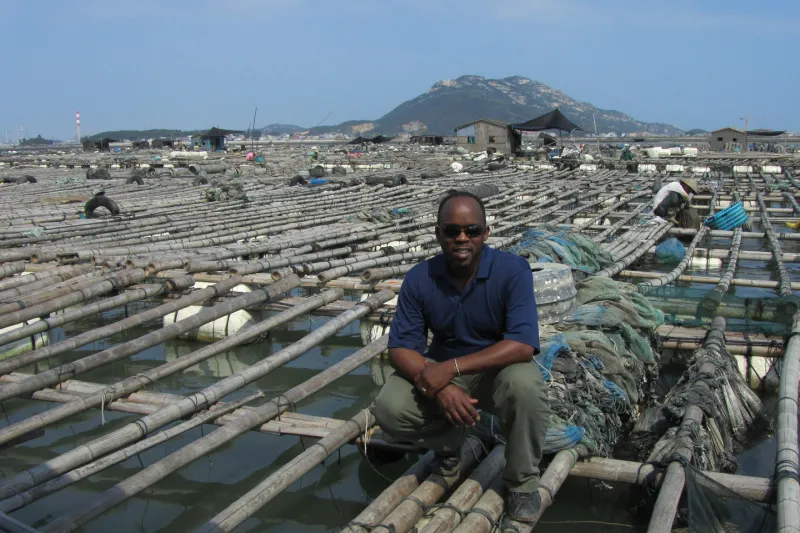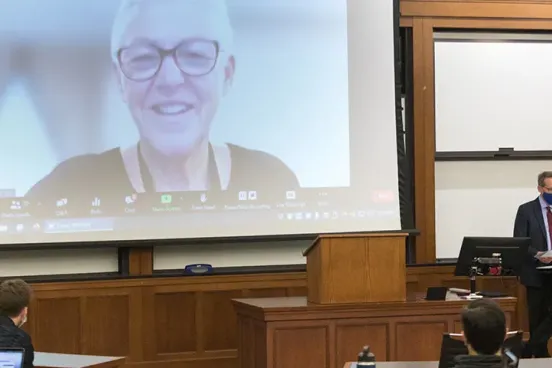
Russell Smith’s clients are slimy. Really. They number in the billions, don’t communicate, and move constantly. He willingly allows many to get the death penalty.
Smith, ’86, is deputy assistant secretary for international fisheries at the National Oceanic and Atmospheric Administration (NOAA). He works with other countries to ensure that the oceans’ fish stocks are sustainably managed, including serving as the U.S. representative to the Western and Central Pacific Fisheries Commission (WCPFC) and the International Commission for the Conservation of Atlantic Tunas (ICCAT). He also represents the United States on the International Whaling Commission.
Smith balances the needs of the fishing industry and the environment to keep marine populations viable for future generations. Since highly migratory species such as tuna and swordfish don’t recognize international boundaries, Smith maintains this industry-environment equilibrium in partnership with a large, diverse set of countries—which he admits can be contentious.
“There are strong economic interests and strong environmental interests,” he says. “Sometimes we succeed in balancing them out, and sometimes we don’t. We have to push hard to find accommodations that everybody can accept. Economic interests are important, and we need to take them into account in decision making. But if we don’t listen to the science, the economics will be undermined as fish stocks decline.”
NOAA estimates that the U.S. fishing industry nets more than $32 billion annually and is responsible for more than 1 million jobs, so internally defining a U.S. position on issues such as overfishing is challenging even before Smith sits down with his international counterparts. But he says the increased cooperation between the government and domestic fisheries in recent years gives him leverage abroad. “I think we generally are seen as an honest broker that follows science in order to establish measures, and then implements and enforces them.”
For a while, the science concerning swordfish and bluefin tuna stocks in the Atlantic Ocean was alarming. Overfishing reduced swordfish to the brink of endangered species status. After ICCAT implemented regulations designed to encourage the regrowth of the stock, swordfish populations now are considered fully recovered. “Participants were willing to make decisions and sacrifices that were in the best interest of the stock,” says Smith.
Bluefin tuna, meanwhile, have been tougher to regulate. Since it’s a very profitable stock, ICCAT faces heavy economic pressure to increase the fishing quotas in the Atlantic, while others propose lower catch levels to allow full population recovery. Smith is especially concerned about a recent decision to increase the quota in the eastern Atlantic—a move he worries is premature. “We’ve taken significant beneficial steps, but the debate is whether or not we can do more,” he says. “In ICCAT, the United States is one of 50 countries. We carry a lot of weight, but we can’t dictate. So sometimes we aren’t entirely satisfied.”
In the Pacific Ocean, there’s an added complexity in the WCPFC’s work: Much of that region’s most fertile fishing grounds for tropical tunas lies in or near the exclusive economic zones of small island states whose economies are centered around their fishing industries. “There’s more focus on helping these states to develop their fisheries and reap a greater benefit from these resources,” Smith says.
Though it was a leap from his youth as a recreational fisherman to his current work negotiating complex international piscine deals, Smith is far from being a fish out of water. He credits a strong team of scientists who provide him with the advice needed to argue U.S. positions. And he has made a career of tackling a wide range of international environmental law issues.
Smith’s first foray into environmental law was at Spiegel & McDiarmid LLP, a small energy firm in Washington, D.C., which led to a position in the policy section of the environment and natural resources division at the U.S. Department of Justice. Part of his work there involved helping foreign governments build their capacity to regulate environmental issues. Prior to joining NOAA, Smith was the director for international environmental policy and multilateral environmental agreements in the Office of the U.S. Trade Representative. He says his time at Michigan Law gave him the negotiating skills and cross-cultural awareness that help him succeed in the international arena.
“Learning to think through complex legal problems with a variety of lenses was very important,” he says. “And now I am privileged to be doing that while contributing to the survival of one of the world’s most essential resources.”







